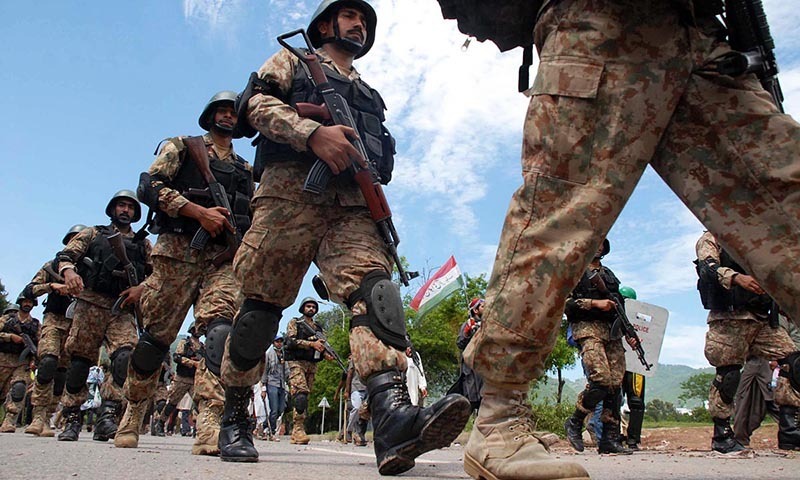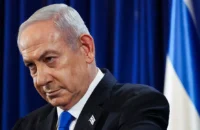Even in the ninth year of uninterrupted democracy in Pakistan, the thrice-elected prime minister is not able to utter a word against the shenanigans of his generals.
By Mohammad Taqi
The recent terrorist attack on the Indian military base in Uri has renewed concern over whether Pakistan’s political leadership has the will or capacity to rein in the country’s military brass or, at least, convince it to stop using jihadistterror for prosecuting foreign policy. Unlike the jihadist attack on the Pathankot airbase earlier this year, Pakistan’s civilian leadership did not even condemn the Uri assault in which 20 Indian servicemen laid down their lives.
As an old Persian adage goes, that they didn’t send a message is a message in itself. Indian Prime Minister Narendra Modi read it correctly: his civilian counterparts in Pakistan appear too meek to be meaningful partners in peace. Almost parallel with Modi’s peace overtures to Pakistan were the earnest efforts by Afghan President Ashraf Ghani to reach out to not just Pakistani Prime Minister Nawaz Sharif but also to the Pakistani army chief, General Raheel Sharif. The Afghan leader’s endeavour also came to a complete nought, costing him a tonne of political capital.
That it took Modi and Ghani over two years to realise how helpless and hopeless their civilian interlocutors across the border are is not exactly a curiosity but a function of the necessary diplomatic song and dance that every responsible leader has to go through. The concern, however, is that this dilly-dallying has been going on for decades where the world has given the Pakistani civilian leadership the benefit of doubt, only to discover that later they are either unwilling or unable to stand up to the military junta.
The PPP’s history of silence
Consider the case of Pakistan’s first democratically elected prime minister, Zulfikar Ali Bhutto. Bhutto along with the military intelligence services was the co-author of Operation Gibraltar, which led to the all-out war with India in 1965. Pakistan’s foreign minister at the time, Bhutto was deeply involved in planning Operation Gibraltar, in which teams of irregular jihadists trained by the Pakistan army’s special services group infiltrated into Indian-administered Kashmir to foment an uprising. Military historian Shuja Nawaz notes in Crossed Swords that while several of those infiltrating teams were named after past Muslim Arab generals, “one force named Nusrat (incidentally the name of Mrs Bhutto, but also meaning victory) was designated to conduct sabotage behind Indian forces at the ceasefire line”. Bhutto was the public face of Field Marshal Ayub Khan’s regime throughout the 1965 conflict, only to ditch it later and walk away without sharing any blame. When he later founded the Pakistan Peoples Party (PPP), one of its ten founding documents was on the Kashmir issue. The fact that Bhutto was perhaps the most jingoistic civilian leader that Pakistan has ever had, however, could not save him from the army’s wrath and he was later hanged after a sham trial commissioned by his hand-picked army chief, General Muhammad Zia-ul-Haq.
Bhutto’s daughter, the late and much lamented Benazir Bhutto, was elected to the high office when the Soviet Union was still in Afghanistan and the Pakistan army, with help from the Saudis and Americans, was running the Mujahideen insurgency against the communist government in Kabul. Despite the constraints of coming to power after 11 long and dark years of martial law, the hope was that Benazir’s PPP may at least take a reasonable position, if not assert itself, on the cross-border terrorism issues. However, when the Pakistan army launched the Mujahideen offensive against the Jalalabad garrison, the civilian government looked the other way. A PPP minister at the time later said: “The Inter-Services Intelligence (ISI) chief General Hamid Gul gave the parliamentarians an in-camera briefing on the Jalalabad attack in February 1989; we opted not to stand in their way.”
The Jalalabad attack that came just days later was repulsed by Mohammed Najibullah’s forces, but it underscored the submissiveness of the Pakistani civilian leadership and its willingness to give the army a free hand, which continues to this day. There is no question that Benazir’s then government had an uphill task countering the intrigues by the military, which did oust her through a palace coup in 1990, but then there is no shortcut to ending the military’s domestic hegemony. Benazir’s second term in the office saw the rise of the Afghan Taliban in 1994, culminating in the installation of the Mullah Omar’s brutal regime in 1996. The civilian government once again did not put as much as a roadblock in the army’s effort to virtually colonise Afghanistan. In fact, the PPP’s interior minister at the time, Naseerullah Babar, used to brag about creating the Afghan Taliban. Babar, a retired major general, also had the dubious credit of harbouring Afghan jihadists in Pakistan in the mid-1970s, long before there was any Soviet intervention in Afghanistan.
The appeasement did not earn the PPP government any longevity in the office and it was toppled yet again in 1996 in a military-orchestrated move. Nawaz Sharif replaced Benazir after each ouster. At the time he owed his political existence to the military establishment and rabble-rouser clerics, and was more than willing to play along as the army continued to unleash jihadists across borders on both sides. It was during Sharif’s second regime that the military squeezed the government to recognise Mullah Omar’s Taliban regime and it readily obliged. According to Sartaj Aziz, “the instructions to recognize the Taliban government were received by the foreign office from DG ISI, General [Naseem] Rana, and Foreign Minister Gohar Ayub Khan promptly announced the decision at a press conference the next day – Sunday, 25 May 1997”. The Kargil fiasco, however, remains the lowest point of Sharif’s that particular stint, with his government either not knowing or not wanting to know of the reckless war unleashed by the Pakistan army. Aziz, by then foreign minister himself, was to later write after a top-level civil-military meeting on May 17,1999: “[Minister for Kashmir Affairs] General (retired) Majid Malik asked me, ‘Do you think the prime minister knew about this operation already?’ I said, I am not sure but I think he was not aware of the entire plan … Then after a pause I added: ‘But one thing is certain: As Pakistan’s foreign minister, I was not aware of this operation till this morning, nor was I consulted about the possible diplomatic fallout of this dangerous operation’.” After the debacle at Tiger Hill, Sharif made a mad dash to Washington, D.C. to help pull the Pakistan army’s chestnuts out of the fire only to be toppled by the same army within four months.
Similar lifelines to the army were thrown by the PPP government when it returned to power once democracy was restored in Pakistan after General Pervez Musharraf’s nine-year dictatorship. The raid by the US special forces which nailed Osama bin Laden right next to the Pakistan Military Academy at Kakul caught the army with its pants down. The PPP government could not muster the political determination to bridle the army even then. The Musharraf-era policies of keeping the pretence of being a US ally in the war against terrorism while providing sanctuary to the Afghan Taliban and its most virulent cohort, the Haqqani network, continued unabated. The Pakistan army continued to run with the hare and hunt with the hounds, and the PPP was willing to plod along. In one instance, brothers of the Haqqani network founder Jalaluddin, Ibrahim and Khalil, were conducting jirgas (tribal meetings) within a stone’s throw of Islamabad, to arbitrate a dispute between the jihadists and the Shia tribesmen of the Kurram agency, with the PPP’s federal interior minister Rehman Malik in attendance. The PPP government did not let out as much as a whimper against the army giving continued sanctuary to the jihadists that attacked both India and Afghanistan. Whether it was the 2008 carnage in Mumbai or the deadly attack on the Indian embassy in Kabul, the killers were unleashed from Pakistan as the civilian leadership stood by idly.
No change
The PPP government was replaced by Sharif in the country’s first ever democratic transition in 2013, but nothing has changed in the Pakistan army’s use of jihadism as the primary tool of prosecuting regional policy. The incumbent army General Raheel, who is scheduled to retire next month, has not only been calling the shots but has also been seen doing so. He has been receiving visiting foreign ministers and heads of states at his military headquarters, while the prime minister watches helplessly. On General Raheel’s watch, the army has rather successfully undertaken Operation Zarb-e-Azb against the so-called bad Taliban, the disgruntled jihadists who attack Pakistan, while letting the good jihadists – the ones who attack Afghanistan and India – go completely unscathed. Not one Afghanistan or India-oriented jihadist has been killed or captured during the two years of Zarb-e-Azb. In fact, the Afghan Taliban were able to congregate in the Balochistan province and select their emir Mullah Mansour after Mullah Omar’s death was confirmed. And when Mullah Mansour was killed in a drone strike inside Pakistan, the Taliban gathered merely a 40-minute drive from the army’s prestigious Command and Staff College, Quetta and appointed the current ringleaderMullah Haibatullah Akhunzada.
Sharif initially made all the right noises over peace with India and Afghanistan but has subsequently abdicated the foreign and national security policies to the army in the inglorious tradition of all past civilian governments, including his own. He has not even appeared inclined to put a damper on the Pakistan army’s lethal proxy war against Afghanistan and attempts to foment a jihadist uprising in Indian-administered Kashmir. The recent incident where a prominent Pakistani journalist, Cyril Almeida, was barred by the civilian government from leaving the country after he reported in the daily Dawn that the civilian and military leaders are at odds over the “international demands for action against Masood Azhar and the Jaish-e-Mohammad; Hafiz Saeed and the Lashkar-e-Taiba; and the Haqqani network”, indicates that Sharif has no stomach for a showdown with the military. While the report itself has several loopholes, such as why the ISI director would need to tour his regional headquarters around the country to inform his subordinates of a policy change, the response to it was quintessentially martial. The verbose Inter-Services Public Relations (ISPR) director, Lieutenant General Asim Bajwa remained completely mum over the ostensibly leaked story. Social media accounts usually seen toeing the army’s party line raised a ruckus against Almeida and his newspaper, which quickly snowballed into an electronic media furor with fingers being pointed at the Sharif government for attempting to malign the army. Almeida stood by his story and his newspaper stood by him, stating that they had dotted the i’s and crossed the t’s. Whatever the veracity of the story, what became eminently clear from the fallout is that the army is neither ready to correct its course nor willing to let civilians even question its conduct. While the newspaper stood its ground the, the government – clearly under pressure from the military – caved and opted to throw the newsman under the bus.
The Uri attack came in the ninth year of uninterrupted democracy in Pakistan and yet the thrice-elected prime minister was not able to utter a word about the shenanigans of his generals. This begs the question of whether the world has a credible civilian partner in Pakistan? Modi and Ghani seem to have concluded that the answer is no. In that context, the Indian military strikes at the jihadist launching pads along the Line of Control (LOC) and the Indian government publicly owning them seem to be departure not just from past Indian policy but also something which the erstwhile Soviet Union and the current US/NATO forces in Afghanistan did not do. The strikes, whether surgical or not and massive or otherwise, have challenged the refrain that Pakistan wears a nuclear suicide vest to the negotiation table. The retaliatory strikes may have succeeded in extricating India from a self-imposed strategic restraint straightjacket and creating an extra rung on the nuclear escalatory ladder, which was perhaps long overdue.
The Pakistan army has been running a jihadist terror shop under its nuclear umbrella for way too long and successfully getting away with it. How much of a military wiggle room India has created for itself remains to be seen, but risking a nuclear Armageddon in a region home to about a quarter of the mankind cannot and should never be the primary option, the Pakistani defence minister’s reckless and irresponsible threats to use nukes notwithstanding. More important is the diplomatic containment effort, starting with the complete regional boycott of the SAARC conference. From Washington, D.C. and the European capitals to the Muslim Arab countries, there has not been a single voice condoning Pakistan’s position. The Soviet Union was a nuclear superpower and yet a versatile regimen of curbs, confrontation, disengagement and diplomacy eventually cowed it down. The key, however, was the consistency in the world’s approach. Flash-in-the-pan tactics never yield results in recalcitrant conflicts. Pakistan’s leaders may opt to live with the disastrous consequences of their decisions and indecisions but the region simply can’t afford to. The response to the Uri attack seems to have broken the perennial paralysis by analysis, whether it can be sustained and expanded remains to be seen.
Mohammad Taqi is a Pakistani-American columnist. Follow him on Twitter @mazdaki




























One Comment